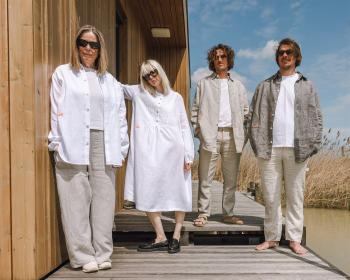Indorama Ventures: Decline in first-half earnings
Indorama Ventures Public Company Limited (IVL), a global sustainable chemical producer, posted a as management continues to execute its three-year IVL 2.0 transformation strategy, maintaining steadfast focus on fortifying the company against a prolonged downturn in global chemical markets.
In 1H25, Indorama Ventures’ Adjusted EBITDA1 fell 21% on a year-on-year (YoY) basis to $606 million. Sales volumes dropped 8% YoY as scheduled maintenance at several plants and a winter freeze in the U.S temporarily disrupted operations. The first six months of the year reflected a continuation of the macro-economic pressures that have beset the industry for more than two years, including new Chinese supply and the impact of geopolitical conflicts in Europe and the Middle East on global supply chains, input costs, and consumer demand.
Throughout this period of profound industry change, Indorama Ventures’ management has continued to drive forward ‘self-help’ actions under IVL 2.0 to optimize operations, reduce fixed costs, and generate cash. Operating cash flow in the first half was strong at $618 million, with 111% Reported EBITDA conversion, while overall fixed costs were reduced by $51 million, net of inflation. These reflect a methodical approach to financial management and commercial excellence as well as the inherent resilience of Indorama Ventures’ unique leadership model across diverse markets.
In the most recent quarter, operations continued to normalize after the winter freeze and planned turnarounds, which was reflected in a 2% rise QoQ in revenue in 2Q25, although the 11% drop on a year-on-year basis reflected the broader industry challenges. In 2Q25, Adjusted EBITDA climbed 20% QoQ to $330 million, led by an improvement in the company’s largest Combined PET (CPET) business, while down 11% YoY.
Business Segments
In 1H25, the Integrated PET portfolio benefited from the asset optimization actions taken over the past year under IVL 2.0, driving a 12% increase in Adjusted EBITDA despite persistent overcapacity in the industry. Overall, CPET segment recorded a 31% YoY decline in Adjusted EBITDA, on a 10% drop in sales volumes, amid multiple planned turnarounds, weaker integrated MEG market conditions in the U.S, and lower NDC production due to the timing of campaign. MTBE profitability normalized in 1H25 with gasoline markets more balanced than in 2024.
Fibers segment posted a 21% YoY gain in Adjusted EBITDA, and a 3% rise in sales volumes, in 1H25, reflecting an improved business environment in Lifestyle and management’s ongoing actions to streamline operations across the segment. Indovida packaging segment was steady across the half, supported by demand in Egypt and the Philippines. Indovinya segment recorded a 6% decrease in Adjusted EBITDA, on a 3% drop in volumes, on weaker performance in its Essentials business driven by higher palm input costs. The Surfactants business was resilient at 17% margin, flat YoY.
Mr. Aloke Lohia, Group CEO of Indorama Ventures, said, “Since we launched IVL 2.0 more than a year ago, we have consistently focused on disciplined self-help actions that are building resilience and helping us to emerge stronger and agile to pursue our growth objectives post weathering this historic downturn. One of the final pegs to hammer down is our Integrated EO/EG business in the U.S Gulf Coast. The Board would like to undertake a strategic review of this business to assess its value to our CPET segment. On the growth front, we continue to fund our Surfactants portfolio, our Packaging business, and our leadership of Recycled Polymers from internal cashflows, as well as remain focused on our deleveraging exercise for longer term financial security.”
Mid-Year Update on IVL 2.0
Since launching IVL 2.0 in March 2024, Indorama Ventures’ experienced management has continued to focus on bolstering resilience and repositioning the company for long-term sustainable growth. Now, more than 1 year into the 3-year strategy (2024-2026), leaders are building a leaner, more agile, and financially disciplined enterprise through a program of footprint optimization, operational excellence, innovation, and digital acceleration.
In the last 12 months, the company rationalized sites in Portugal, Netherlands, Australia and Canada, realizing $116 million in fixed-cost savings. It expects annualized savings of $130–150 million by 2025 and $170–190 million by 2027. Furthermore, the company expects cash proceeds of $190–200 million from the proposed sale of rationalized property from 2H25 through to 2026.
Indorama Ventures has reorganized its four business segments with empowered, accountable leadership structures and clear mandates to deliver industry-leading performance across the cycle. A similar reorganization of Corporate functions is currently underway. The segments are already benefiting from a comprehensive digital transformation program following the successful rollout of SAP S/4HANA, which is providing the foundation for additional tools including Salesforce and Workday, and AI-driven solutions for manufacturing and maintenance.
The company continues to maintain a strong liquidity position, with $1.8 billion as of June 2025, and a focus on financial discipline and driving sustainable free cash flow to further strengthen the balance sheet towards a longterm target of Debt/EBITDA at 3x. In the first half, Indorama Ventures raised $1.5 billion through long-term refinancing at improved spreads, which helped reduce costs and ensure liquidity through to 2027.
As part of its renewed growth strategy to invest in high-value segments and select growth markets, in the first half the company completed the acquisition of a 24.9% equity stake in EPL. An expanded pipeline of innovative highvalue-added (HVA) products includes new offerings such as PEN polymers and PET-G, which generate better margins than traditional PET; and two leading brands in the energy extraction sector, Kemelix and Flowsolve. The Mocksville hygiene fibers facility in the U.S commenced operations during the half, benefiting from the U.S tariffs, while a strategic partnership with PolySource to distribute specialty polymers for advanced applications is broadening the company’s presence in performance materials.
In 2Q25, Indorama Ventures—one of the world’s leading PET recyclers—marked a significant milestone in recycling 150 billion bottles since operations began in 2011. The company is accelerating its ambition to recycle 50 billion bottles a year, having recycled the last 50 billion bottles in 2.5 years.
Indorama Ventures Public Company Limited






























